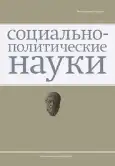Socio-cultural Aspects of the Transformation of National Identity in the Post-Soviet Period: Socio-political Analysis
- Authors: Likhanova T.Y.1
-
Affiliations:
- Institute of Socio-Political Research of the Federal Center of Theoretical and Applied Sociology of the Russian Academy of Sciences (ISPR FCTAS RAS)
- Issue: Vol 13, No 4 (2023)
- Pages: 55-64
- Section: Sociology of Culture
- URL: https://journals.eco-vector.com/2223-0092/article/view/583314
- DOI: https://doi.org/10.33693/2223-0092-2023-13-4-55-64
- ID: 583314
Cite item
Abstract
The purpose of the study is to consider the foundations of national identity, such as historical and cultural memory, which also include the traditional values of society and the attitudes of both society and the state towards them. Consider which values are key-values for Russian society, how actively they are reproduced at the level of cultural translators. Results: the data obtained showed that there is no real consensus in Russian society about a single system of values shared by both society and the state. The policy pursued by the state often contradicts the values declared by the state. It is necessary to take real effective measures in order to bring, first of all, the economic and cultural policy of the state into line with the traditional spiritual and moral values of Russian society. There is an acute contradiction in society between those values that are perceived by society as fundamental, and those values that are transmitted to society, including by the leaders of public opinion who enjoy the greatest confidence. Society is clearly aware of the inconsistency of the current situation with its real needs, as well as the urgent need to implement these values. In particular, this applies to social justice. The lack of consensus makes the field of values open to outside influences, capable of being filled with values from any sources, including foreign elements that consciously or unconsciously destroy the national self-consciousness.
Full Text
About the authors
Tamara Yu. Likhanova
Institute of Socio-Political Research of the Federal Center of Theoretical and Applied Sociology of the Russian Academy of Sciences (ISPR FCTAS RAS)
Author for correspondence.
Email: Ltu1311@mail.ru
junior researcher
Russian Federation, MoscowReferences
- Berezina N.V., Bogdanov I.Ya., Velikaya N.M. et al. Russian society and the state in the context of global multipolarity. The socio-political situation of Russia in 2022: Monograph. V.K. Levashov (ed.). Moscow: FCTAS RAS, 2023. 549 p.
- Weber A.B. Social justice and development. Free Thought. 2015. No. 5. No. 95–108. (In Rus.)
- Galkin A.A. Objective challenges and national identity: Trends and problems. Politiya. 2013. No. 1 (68). URL: https://cyberleninka.ru/article/n/obektivnye-vyzovy-i-natsionalnaya-identichnost-tendentsii-i-problemy (data of accesses: 10.07.2023).
- Nora P. Disorder of historical identity. Historical Notes. 2010. No. 13 (131). Pp. 153–159. (In Rus.)
- Scientific notes of the FCTAS RAS. M.K. Gorshkov (ed.). Issue 3. The potential of interethnic harmony as a resource for the consolidation of Russian society. Moscow: FCTAS RAS, 2019. P. 8.
- Korten D. When corporations rule the world. St. Petersburg: ViT-print Agency, 2002. 327 p.
- Toffler E. The third wave. Moscow: AST, 2009. 795 p.
Supplementary files












